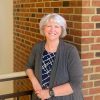This article is more than 5 years old.
I recently returned from Indianapolis, where I attended the Midwest Archives Conference annual meeting. I have been a member of MAC for nearly 20 years, and have served in a number of offices, including chairing the Nominating Committee, Council member, Vice President, and most recently, as President (2009-2011). MAC is an interesting organization, for while it is technically a regional group, it does have a large national and international membership and also publishes its own journal, Archival Issues.
I still have ongoing service activities within MAC. As Past President, I serve on the President’s Award Committee, which recognizes organizations who make a significant contribution to the archival community. This year’s winner was the Earth Resources Observation and Science (EROS) Center (part of the U.S. Geological Survey), located near Sioux Falls, SD. One of their primary data collections is called Landsat, short for land satellite. Landsat’s global archive contains over 3.5 million individual images and these images are available for free to the public. I was also recently appointed as co-chair of the Education Committee. The Education Committee is responsible for the selection of workshops for the annual meeting, planning for the long term, and organizing a Speakers’ Bureau. The Bureau has potential implications for the national archives scene and as the idea was generated during strategic planning when I was MAC President, I feel obligated to assist in its development.
MAC normally has 300-350 attendees (Indy had 400!) at the annual meeting, and many of the members have known each other for years. The programs are always of high quality, and this year has proven to be no exception. The opening plenary was given by Film Professor and member of the Organization for Transformative Works, Francesca Coppa. She focused her remarks on fan works and culture, and the online creation of fan-based creations in a wide variety of formats, including fiction, artwork, film/video, textiles, wikis, and songs. There are all sorts of copyright and preservation issues, and the group recently created a new software, The Archive of Our Own, which enables the various groups to preserve and organize their own work. The most interesting part of the presentation was her discussion of tagging and the creation of folksonomies by “tag wranglers,” and how they use tagging to capture highly complex concepts.
I also attended As It Happens: Documenting Community Tragedies and Transformations, a session with representatives from the University of Northern Illinois, the Evangelical Lutheran Church, and my “home” state of Iowa’s Postville Collection. Each presentation described the issues involved with documenting sensitive events (i.e. campus shootings, religious changes, and a federal raid on a meatpacking plant) and how to sensitively document these events for the future. The real challenge, in addition to diplomatic skills, was the preserving of such a wide variety of formats, i.e. artifacts, oral histories, film, video, banners, memorials, and photographs.
Crowdsourcing Transcription was a popular session-the presenters focused on the technical and staff efforts to provide such an experience for the public. One of the first of such efforts was the New York Public Library’s What’s on the Menu project: http://menus.nypl.org. While crowdsourcing is an excellent way to connect with the public, the time, labor, and technical requirements involved make it extremely difficult to implement. Proactive Collecting was another interesting session, where speakers described assessing a regional or topical “information ecosystem” and how to integrate a variety of diverse sources in a variety of locations in order to provide a more holistic view of the past.
Two of the best sessions I attended were both on Saturday morning. Three graduate students at the University of Wisconsin-Madison described their project, Sounds of the Archives, where they produced podcasts using archival material. The other session focused on the many issues related to the preservation and storage of electronic records, and gave excellent advice as well as valuable resources. The resources included the Duke Data Accessioner (http://library.duke.edu/uarchives/about/tools/data-accessioner.html: for migrating information off disks prior to appraisal), Firefly SSN Finder (which searches for those pesky social security numbers which can lead to identity theft) and the Australia Digital Preservation Software Platform (http://sourceforge.net/projects/dpsp/) which offers a number of open source products for better management of electronic and born digital records.
All in all, this was a very productive meeting, and it will take me quite a while to fully assess everything I learned and how to utilize it here at Wake!

6 Comments on ‘Midwest Archives Conference (Indianapolis, Indiana)’
I can see how difficult it would be to archive events such as those you describe. To be accurate and sensitive must be quite the task, especially when those you are collecting from are so emotionally attached to the event!
You caught on really fast to our custom of writing up conference attendance. Great report!
Sounds like a great conference! Thanks for filling us in on the sessions you attended.
Lots of new things to explore! Thanks for sharing.
I enjoyed reading your conference experience.
I especially enjoyed reading about the Organization for Transformative Works and their software: The Archive of Our Own. Fascinating.
Thanks for sharing!